Remembering Russell Ebert: greatness on the field and well beyond
Russell Ebert, the record winner of four Magarey Medals and one of South Australian football’s greatest players, has died aged 72. Michelangelo Rucci collects the tributes to the Port Adelaide legend.

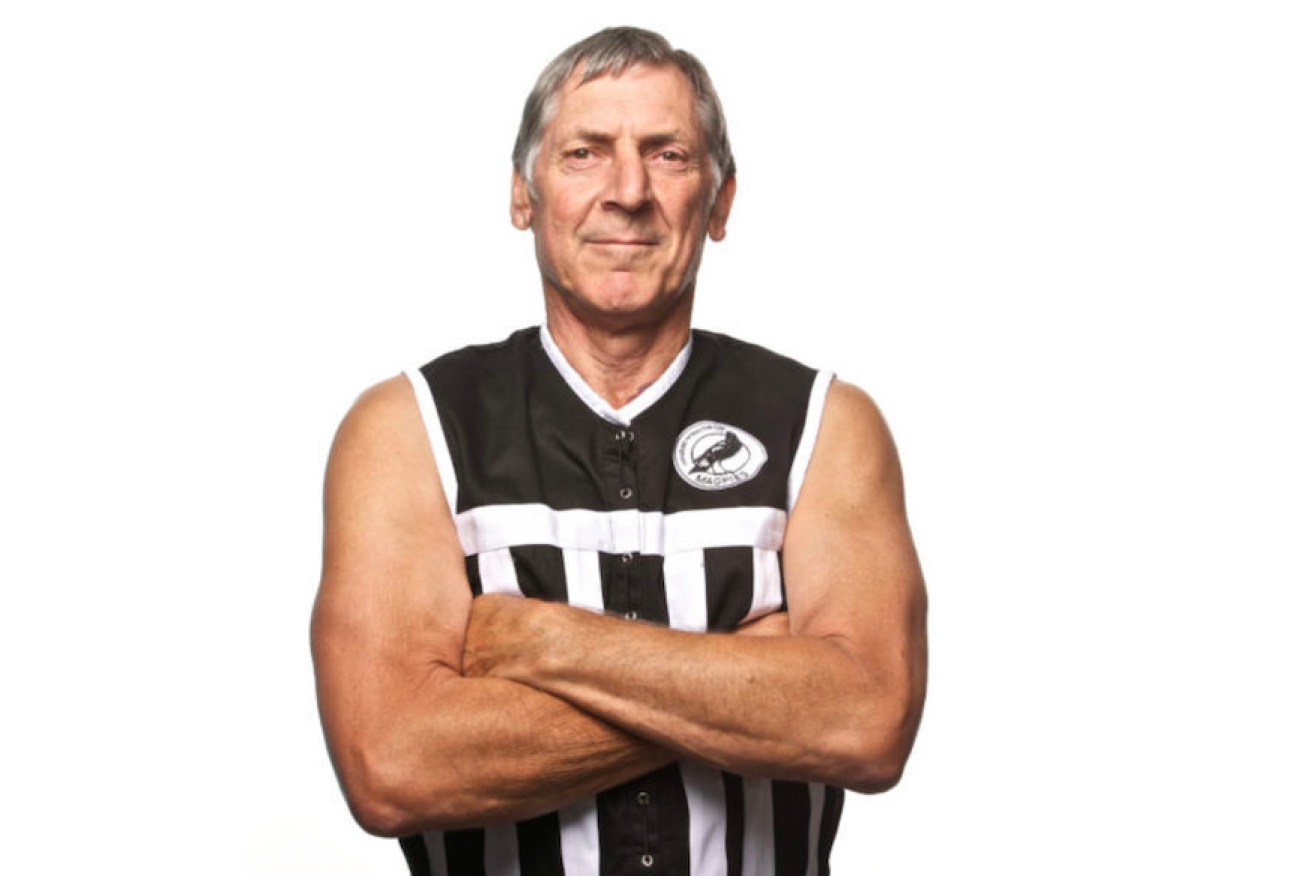
Russell Ebert in 2013 wearing his cherished lace-up jumper, photographed by his former teammate Michael Errey.
They called him “God”. To the Port Adelaide Football Club faithful, Russell Ebert was indeed a heaven-sent messiah while the Riverland recruit dominated South Australian football during the 1970s.
But his extraordinary resume – topped with the record four Magarey Medals won in 1971, 1974, 1976 and 1980 – was built upon more than any blessing from above.
“Russell became the best player at our club, with his hard work ethic not just by natural talent,” said Port Adelaide premiership captain and former chief executive Brian Cunningham.
Ebert on Boxing Day last year, at a former Port Adelaide players’ and officials’ reunion, revealed he had been diagnosed with acute myeloid leukemia, a cancer that hinders the production and function of blood cells. After months of intensive care in hospital, Ebert returned home at the start of May. He died on Friday, aged 72.
The Port Adelaide Football Club announced Ebert’s death late on Friday afternoon. The club statement says:
The Port Adelaide Football Club on behalf of the Ebert family sadly advises that club legend Russell Ebert passed away peacefully this afternoon after a battle with leukemia.
The four-time Magarey Medallist and member of the Port Adelaide Football Club and Australian Football Hall of Fame passed away at home surrounded by his family, aged 72.
Ebert, who played a club record 392 games and won three premierships and six best and fairest awards, was recently elevated to legend status in the South Australian Sport Hall of Fame.
The club asks that the Ebert family’s privacy is respected at this time and thanks everyone on the family’s behalf for the love and support it has received in recent months.
AFL chief executive Gillon McLachlan paid tribute to Ebert this afternoon remembering not just a great player, but also a great man.
“The child in me will always admire the great footballer but the adult that I am is in awe of what Russell Ebert was as a man, and his loss after bravely confronting his illness is devastating for his family, for his club, his many fans and for the state of South Australia, where he has given so much,” McLachlan said.
“He was everything you would hope to be in a man, and perhaps the best of all of us.”
Port Adelaide Football Club president David Koch said today: “During its 151-year history, there have been so many champions of our club and a handful of legends. Russell Ebert stands tall among the legends of the Port Adelaide Football Club. While all the champions and legends played for Port Adelaide, Russell lived Port Adelaide.”
The achievements – and the lasting memories of how Ebert could command a football match – have created a 50-year debate: Ebert or three-time Magarey Medallist Barrie Robran as the greatest South Australian footballer of all-time.
Ebert, with sincerity rather than just modesty, always answered Robran.
Robran told InDaily earlier this year: “If that is the case (the call on South Australia’s best footballer is between Ebert and Robran), we should respect each of us had different abilities (but) it is nice to be mentioned …”
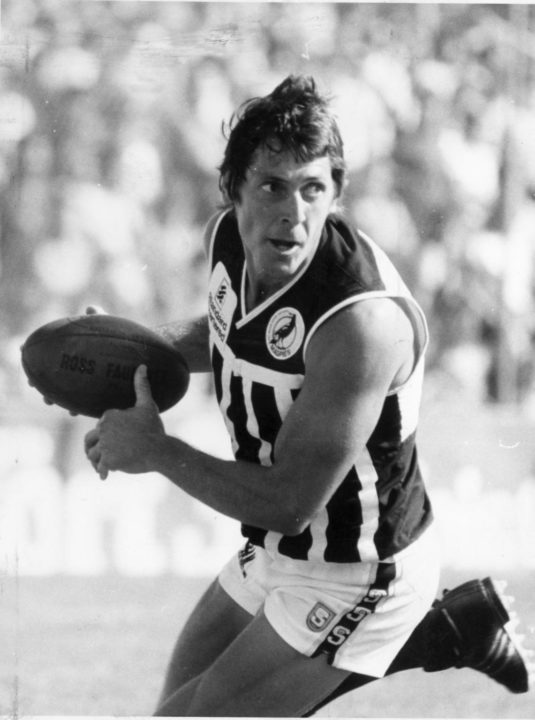
Russell Ebert in his playing days
Ebert’s record certainly leaves him without a challenger to the title of Port Adelaide’s greatest player: four Magarey Medals, a record six best-and-fairest titles at Alberton, a club record 392 SANFL league games, club captain for five seasons and captain-coach for three. His most-treasured medals were from the SANFL league premierships, three of them – starting with the drought-breaking 1977 title in the SANFL’s centenary season.
Ebert’s acceptance speech as captain before lifting the Thomas Seymour Hill premiership trophy that had been absent from Alberton for a then-record 12 years is part of Port Adelaide legend: “It’s taken us a bloody long time, but by geez it’s worth it.”
Famed sportswriter and broadcaster Mike Coward covered SANFL football for both The Advertiser and Channel Seven, as host of the Saturday night Big Replay, while Ebert established himself as one of South Australia’s greatest players.
Coward’s recollection of Ebert’s playing style – and influence on the game beyond Port Adelaide – perfectly captures the image of the man they called “God”.
“It is problematic whether there has been a better player anywhere when the ball was on the ground,” Coward said. “At pace and with his strong body arched, Russell’s balance, power and calibrated feints in and around packs, often with the ball in one hand, exemplified his greatness.
“Blessed with sure hands and a sixth sense of which he modestly made light, his courage complemented an exceptional creativeness by hand and foot. Russell’s legacy extends well beyond his beloved Port Adelaide Football Club. He enriched the game in South Australia and beyond.”
The tributes to Ebert extend well past the Alberton confines of the Port Adelaide Football Club.
Ebert made his SANFL league debut as an 18-year-old in 1968, taking advantage of full-forward Eric Freeman’s absence on an Ashes cricket tour of England. He finished the season as the team’s leading goalkicker (44 goals) and for the first time on the Port Adelaide honour board that he would dominate for almost 20 years.
Magarey Medallist and Sturt champion John Halbert saw Ebert for the first time in the 1968 Anzac Day rematch of the 1967 grand finalists. It was Ebert’s third league game. He kicked six goals in Port Adelaide’s 19-point win.
“And we were left a bit surprised by this lad Port Adelaide had at full-forward,” said Halbert of the Sturt players,
“Russell was such a dynamic footballer. Watching him, you would have thought everything came relatively easy for him. But he worked hard when he played.
“Russell was not casual in what he could do on the football field. He was committed to hard work. He had this strength. He was extremely strong when the ball hit the ground. He had intensity. He was not as tall as others, but he would match the rest in the air with his marking being as good as any of the big men. He was durable, as noted by his playing more than 400 senior games.”
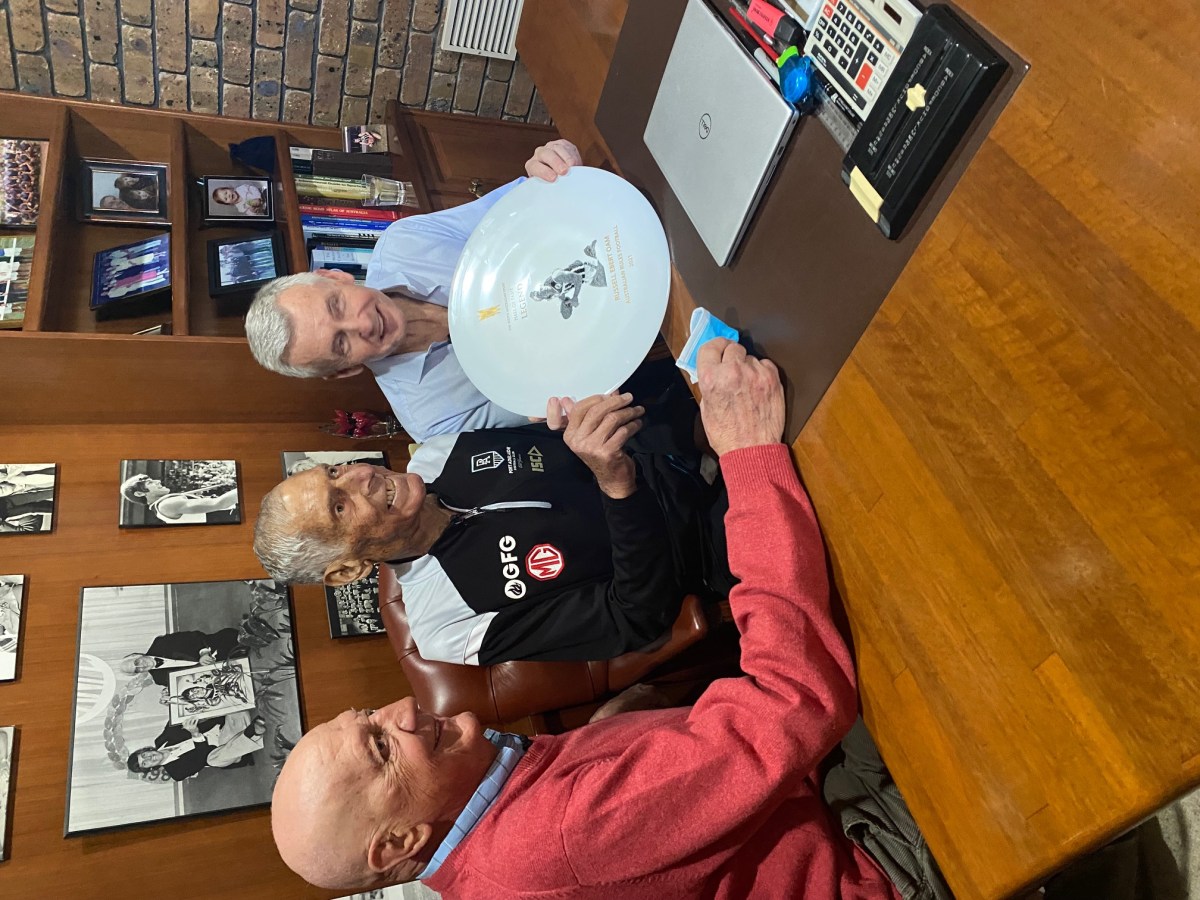
Barrie Robran and Bruce McAvaney present Russell Ebert with a commemorative plate marking Ebert’s elevation to Sport SA Hall of Fame Legend status (Photo: supplied).
Cunningham was Ebert’s team-mate, premiership captain in 1980 and 1981 and boss when he called Ebert back to Alberton to lead Port Adelaide’s successful community programs.
“The wild country recruit from the Riverland grew up to be a selfless, caring person,” Cunningham said. “People will first remember Russell Ebert as the four-time Magarey Medallist. But we should also remember the person – and he was a very good man. He was a genuinely caring person who made the people who came into his left feel important. He definitely took after his mother (Doreen) in that way.
“As a footballer, Russell made our game – as team-mates – easier. I played a couple of hundred games in teams with Russell and if became second nature to make position knowing Russell would get the ball to you.
“I am quite proud we were able to get Russell back to the football club to run our community programs where he made a positive difference to so many lives, as he did during his time supporting the Novita charity.”
Magarey Medallist Peter Woite joined the Port Adelaide league side in 1969 and was vice-captain to Ebert from 1974-1978.
“We became great mates, not just team-mates,” Woite said. “Russell was bulletproof to me. He was a great friend because he would do anything for you. He has done so much for so many people. He had a great attitude in life – and that is what I will remember.
“Russell is easily the best Port Adelaide footballer ever. He had a great appreciation of the game. He drew the ball to himself like a magnet – and he brought other players into the game with his skills. Imagine being on the end of his kicks like (SANFL record-breaking goalkicker) Tim Evans was.”
Woite’s strongest football memory with Ebert is the 1977 SANFL grand final win against Glenelg at Football Park.
“Russell and I had played in three losing grand finals (1971, 1972 and 1976),” Woite said. “We had that disaster against Sturt the year before and Russell was hurting by being without what we play for – premierships. To win in 1977 was a great relief – as you can still hear in his voice when you watch that vision of him taking the premiership flag.”
Robran recalls Ebert by saying: “As a player, Russell always was in control. He could play ‘high’ – and there are not enough photographs of his high marks. Thankfully, you can see how good he was for high marks on video. He was a great player when the ball was on the ground – this too was his strength even as a player who stood at 6’2. He could play very well ‘high’ and ‘low’.
“Russell also never lost his feet. And he is famous for how he used his hands with that overhead handball; for that to be remembered 40 years on is quite an achievement. That handball – and the way it mesmerised opponents – was brilliant.
“Handball was not a feature of the Port Adelaide game when Russell started playing league football in the 1960s. He was the exception and Russell started handball at Port Adelaide as a way to bring his team-mates into the game.”
Ebert stepped away from the SANFL in 1979, finally answering the persistent calls of VFL club North Melbourne where fellow Magarey Medallist Malcolm Blight was a superstar. Ebert played all 25 matches – as a fly-in, fly-out player training once a week at Arden Street – and won the admiration of coach Ron Barassi for his ball-winning traits that reached a peak with 41 touches against Melbourne at Arden Street in round 20.
“He had a sports store to manage in Adelaide; how bloody difficult that was for him – fly in, train Thursday night, play Saturday, fly out,” recalled Blight.
“On the training track, Russell had fine touch – he never fumbled; the great ones never fumble. He was clean with his ball work and when he kicked the ball, he did not miss. He was a talent.
“That was not an easy year at North Melbourne; we had injuries and Barassi put Russell in many spots. When he was back at centre, his position, he showed his wares.
“At North Melbourne, it is unanimous – they love him.”
“Barassi loved him,” said Norwood champion Michael Taylor, who also moved to the VFL playing 92 league games with Collingwood from 1981-1984. “He finished fourth in North Melbourne’s best-and-fairest in 1979 and came back to the SANFL to win his fourth Magarey Medal.”
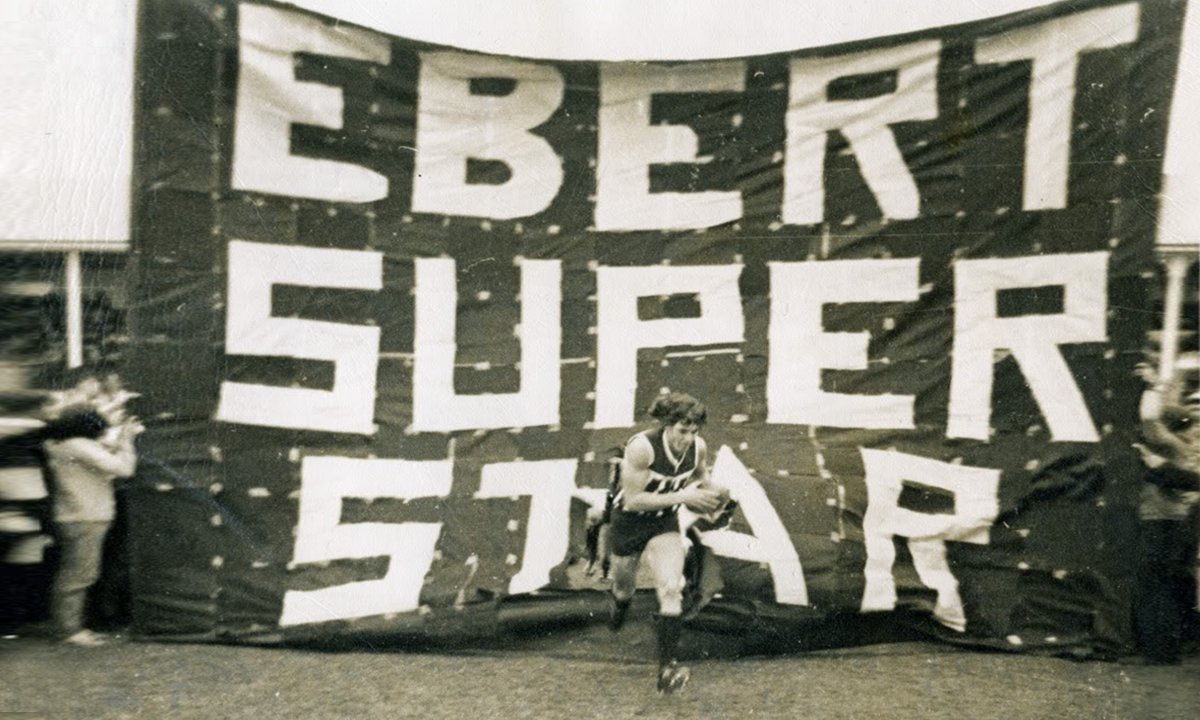
What did the umpires see in Russell Ebert to repeatedly honour him with South Australian football’s highest individual honour?
“I was lucky to umpire Russell’s early games in the late 1960s and early 1970s – and privileged to see at the same time two of the greatest footballers to pull on boots, Russell Ebert and Barrie Robran,” said Hall of Fame umpire Murray Ducker.
“They were different, but both were champions.
“One of the hallmarks of a Magarey Medallist is fairness – and Russell never did anything behind the door. He played the ball. He was intense. He could control a game.
“And he had to get votes when we filled out our Magarey ballots. Around the ball, Russell did so much to win possession – and he would then deliver it beautifully.”
“Russell had everything – and then he invented that overhead handball. I assure you it was not a throw. It was a technique.”
Taylor often in the heady Port Adelaide-Norwood rivalry tried to tackle Ebert and watched the ball move on with that trademark overhead handball.
“Russell was so strong that even if you gripped him across the hips, he still managed to lift his arms and get that handball away,” Taylor said. “He set a high bar. I played on him a fair bit and his skills were immaculate. He was the best player I had to deal with – by a mile. He was a gamebreaker. He was the complete player.
“And he was a great man. Russell put a lot back into football with his coaching of junior State squads and with those community programs at Port Adelaide.
“I also came to know Russell through business when he had a courier delivery business at Regency Park. He never let me down in business – and he always good to visit to chew the fat on where football was going.”
Ebert remains the last playing coach to take an SANFL team to a grand final – the epic 1984 play-off lost to Norwood at Football Park. He was controversially sacked at the end of the 1987 season to allow Port Adelaide to usher its premiership master John Cahill back to Alberton.
Ebert moved to Woodville where he secured the night premiership title in 1988 Escort Cup, beating Port Adelaide – and Cahill – in the final.
“Funny how those quirky things play out in football,” said Bill Sanders, the Woodville Football Club chairman – and former bank colleague – who approached Ebert to coach the Warriors while Port Adelaide fans led protest marches demanding Ebert’s reinstatement at Alberton.
“Against all the odds, Russell drove the karma bus that night.”
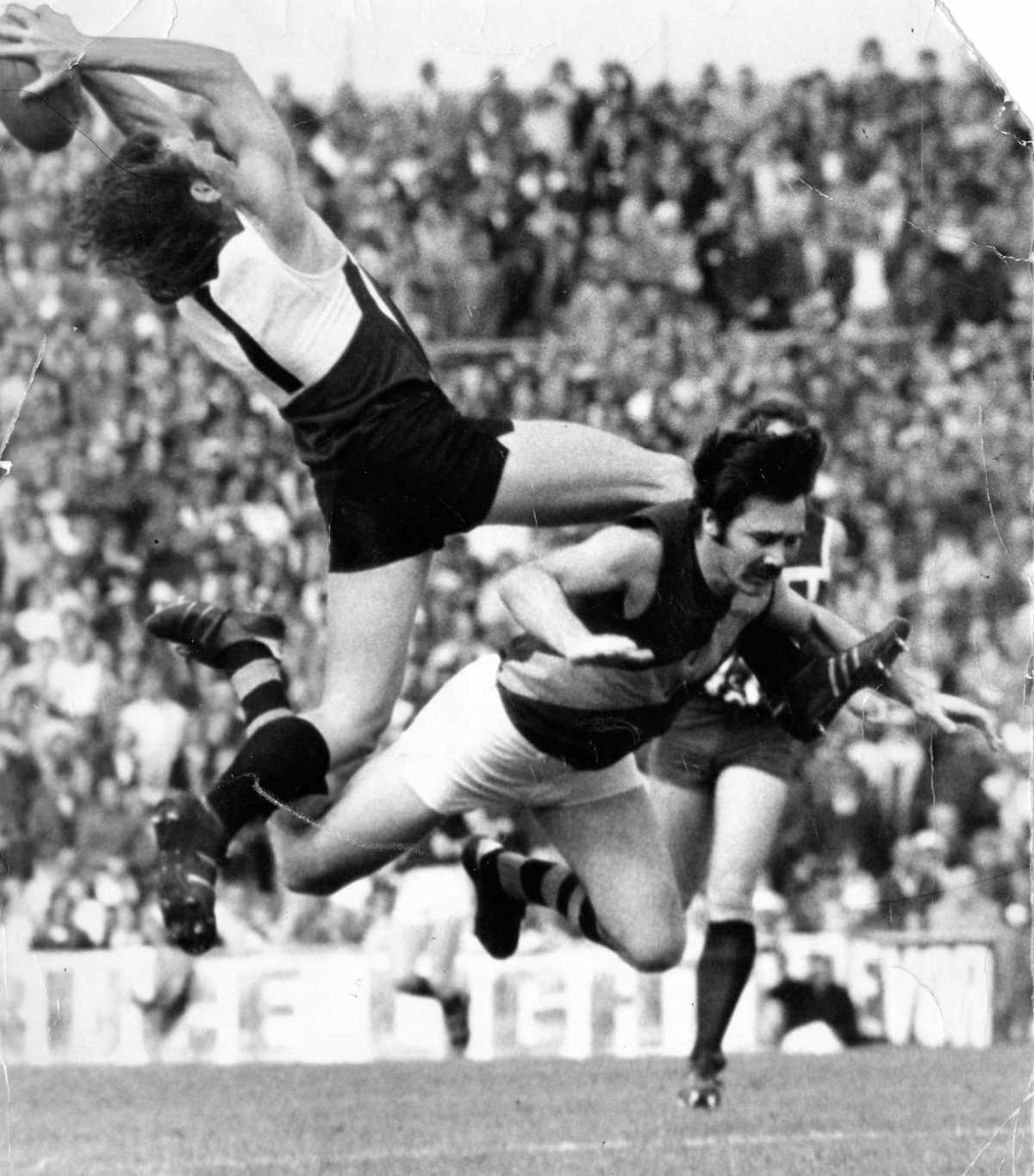
Ebert during the 1974 preliminary final against Glenelg. Photo: Port Adelaide Football Club
Ebert’s greatest success in coaching was during his decade-long command of the South Australian under-17 teams that won national Teal Cup titles in 1991 and 1995.
Glenelg premiership hero Peter Carey assisted Ebert in one campaign and noted why he was short-changed as a league coach.
“How do I say he was not ‘devious’ enough to be a league coach,” Carey said. “His honesty and integrity was unquestionable. We were to play a Denis Pagan Victorian team in a dead rubber match before the finals and I suggested to Russell that we put our players in unusual positions to keep our tactics secret before the grand final.
“But Russell would not have it. And we did win the grand final anyway. That is the bloke Russell was – it was black and white, no grey. It was do it the right way and never try anything in between.
“What a great man he was. And he always looked for the positive in anything he did. Great footballer. The very best. Loved by his team-mates and all because he played fair. He was always wanting to win the footy.”
Max Basheer, the SANFL’s longest-serving president, called Russell Ebert’s name more than any other in Magarey Medal counts during the 1970s.
“Russell was a great player; one of the best of all time,” Basheer said. “Russell and Barrie Robran are the two best players I have seen. They were exceptional footballers.
“It is a very sad moment for all of us in South Australia that Russell has left us she he was so young. We will remember not only what he did at Port Adelaide and for the SANFL, but his commitment to the national growth of the game as a State player and coach.
“Russell was a character. I liked him, the footballer and the man. I never did tire of reading his name on Magarey Medal voting slips because his style of playing was so deserving of such recognition. His speed, his marking, his immaculate kicking. He was great in all parts of the game. There was no weakness in his football. He deserved all the praise he earned as a most brilliant footballer.”
Sanders remembers the strength – and determination – Ebert possessed by recalling a post-match Saturday night when he hosted a social gathering at his Woodville South home.
“It was late and we had had a few when I made mention of the danger a ghost gum in the backyard posed to our house and the neighbours,” Sanders said. “We had a ridiculous quote to clear it away, but Russell said, ‘I’ll fix that’.
“The next morning, I am still in bed when I hear a chain saw roaring at 7. Outside, Russell was up the tree, Rambo-style with biceps bulging, cutting away this tree. He stopped after a while, went to take training at Woodville Oval and as back at noon to finish the job.”
Ebert is survived by his wife Dian and three children, including Brett who was Port Adelaide’s first AFL father-son draftee. He played 166 AFL games and joined his father on the Magarey Medal honour roll in 2003.
Russell Ebert’s two brothers, Jeff and Craig, also played league football at Port Adelaide.
“In life away from football, his wife Dian and family always came first,” said former Glenelg captain Peter Marker. “He had a dry, wicked sense of humour, never sought recognition for his philanthropic work – the extent of which will probably never be known – and when he made a commitment, he always followed through.”
RUSSELL EBERT
Born at Berri, June 22, 1949
Played 392 SANFL league games with Port Adelaide (1968-1978 and 1979-1985), 25 VFL league games with North Melbourne (1979) and 29 State games for South Australia (1970-1983).
Coached Port Adelaide, 1983-1987; Woodville, 1988-1990; South Australia at both senior (1996-1998) and junior level (1991-1999).
Achievements: Magarey Medallist, 1971, 1974, 1976 and 1980; Port Adelaide premiership player, 1977, 1980 and 1981; Port Adelaide best-and-fairest, 1971, 1972, 1974, 1976, 1977, 1981); Port Adelaide leading goalkicker, 1968; Port Adelaide captain, 1974-1978 and 1983-1985); South Australian State team captain, 1975, 1977 and 1983.
Honours: Australian Football Hall of Fame, South Australian Football Hall of Fame; Port Adelaide’s greatest team of 1870-2000 as the centreman; South Australian Sport Hall of Fame – legend status.




